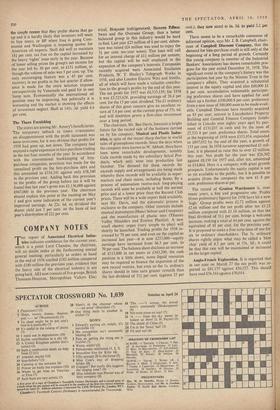COMPANY NOTES
rr HE report of Associated Electrical Indus- tries tries indicates confidence for the current year, which is a point Lord Chandos, the chairman, will no doubt ,make at the forthcoming annual general meeting; particularly as orders in hand at the end of 1958 totalled £182 million compared with £180 million the previous year, evidence that the heavy side of the electrical industry is not going back. AEI now consists of five groups, British Thomson-Houston, Metropolitan Vickers Elec- trical, Hotpoint (refrigerators), Siemens Edison Swan and the Overseas Group; thus a better balanced group in this industry would be hard to find. Last year £25 million of 6 per cent. deben- ture was raised (£4 million was used to repay the 3+ per cent. ten-year notes). This loan will call for an interest charge of £14 million per annum; but the capital will be well employed in the expansion of the company's interests. Companies recently acquired were Associated Insulation Products, W. T. Henley's Telegraph Works in 1958, and also London Electric Wire and Smiths, all of which will have made a valuable contribu- tion to the group's profits by the end of this year. The net profit for 1957 was £4,333,139; for 1958 it was £5,525,628, providing earnings of 26.4 per cent, for the 15 per cent. dividend. The £1 ordinary shares of this great concern give an excellent re- turn of 5.4 per cent. at the current price of 57s. 6d. and will doubtless prove a first-class investment over a long period.
The chairman, Mr. Ben Davis, forecasts a bright future for the record side of the business carried on by his company, Musical and Plastic Indus- tries, in spite of the recent sharp decline in world sales of gramophone records. Since the days when the company were known as W. Abbott, there have been some remarkable developments, notably Gala records made by the subsidiary Selcol Pro- ducts, which only went into production last October. The demand for these records far exceeds supply and arrangements are being made whereby these records will be available in super- markets and chain stores, including Boots. By a process of automation twelve-inch long-playing records will soon be available at half the normal price and at a lower price than the Record Club prices. There will be a wide export field available, says Mr. Davis, and the automatic process is exclusive to the company. Other interests include musical instruments (Henri Selmer and Company) and the manufacture of plastic. toys (Thames Valley Moulders and Everest Plastics). A new small electric organ (very simple to play) will shortly be launched. Trading profits for 1958 in- creased by 78 per cent, and even on the capital as increased last year—it is now £255,000—equity earnings have increased from 46.3 per cent, to 70 per cent. The balance sheet discloses an increase of £115,000 in net assets at £363,290, the cash position is a little down, more liquid resources may be required to finance the expansion of the new record venture, but even so the Is. ordinary shares should in time earn greater rewards than the last dividend of 324 per cent. (against 25 per cent.); they now stand at 6s. 3d. to yield 5.2 per cent.
There seems to be a remarkable consensus of informed opinion, says Mr. J. B. Campbell, chair- man of Campbell Discount Company, that the demand for hire-purchase credit is still only at the beginning of a long period of growth. Certainly this young company (a member of the Industrial Bankers' Association) has shown remarkable pro- gress for the year ended December 31, 1958. The significant event in the company's history was the participation last year by the Minster Trust in the company's affairs. They acquired a substantial interest in the equity capital and also £60,000 £1 8 per cent, accumulative redeemable participat- ing preference shares and have applied for and taken up a further £100,000 8 per cent. preference from a new issue of 500,000 soon to be made avail- able. Campbell Discount have recently acquired an 83 per cent. interest in Lincolnshire Property Building and General Finance Company (estab- lished in Lincoln over eighty years ago) by pay- ment of £131,035 in cash and by the issue of 27,533 8 per cent. preference shares. Total assets at the beginning of 1958 were £353,954, expanded to £897,052 by the end of the year, a growth of 153 per cent. In 1958 turnover approached £1 mil- lion; it is planned to raise this to over £2 million this year. Net profit for the year was £26,302 against £8,190 for 1957 and, after tax, amounted to £14,864. Here is a company with great growth prospects. Unfortunately the equity capital is not as yet available to the public, but it is possible to acquire (from the company) the new £1 8 per cent, preference shares at par.
The record of Gratton Warehouses is, over many years, a fine and progressive one. Profits (from preliminary figures) for 1958 have hit a new `high.' Group profits were, £2.72 million against £2.66 million and the net profit after tax £1.23 million compared with £1.10 million, so that the final dividend of 314 per cent. brings a welcome increase, making a total of 44 per cent. against the equivalent of 41 per cent, for the previous year. It is proposed to make a free scrip issue of one for six to ordinary shareholders. The 5s. ordinary shares rightly enjoy what may be called a 'blue chip' yield of 4.2 per cent. at 53s. 3d.; it could be that this rate will be maintained or increased
on the larger capital. • Anglo-French Exploration. It is regretted that in our note on March 27 the net profit was re- ported as £81,175 agOinst £56,527. This should have read £56,164 against £50,014.














































 Previous page
Previous page